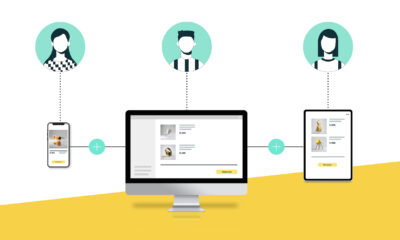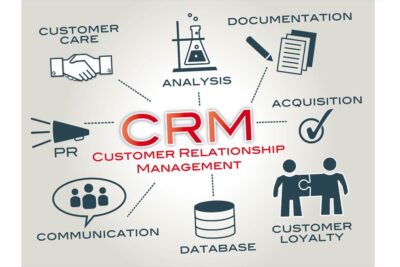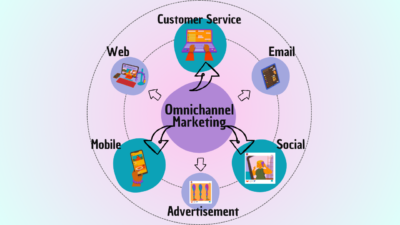Healthcare provides deal with their customers at a personalized level. This makes personalized marketing in healthcare a growing trend that seeks to provide patients with tailored experiences that meet their unique needs. This approach recognizes that patients have different preferences, behaviors, and health conditions that require personalized attention. By leveraging technology and data analytics, healthcare providers can deliver targeted messages, products, and services that resonate with patients and improve their health outcomes.

The Concept of Personalized Marketing in Healthcare
Personalized marketing is a strategy that tailors content and messages to individual consumers based on their preferences, behaviors, and characteristics. In healthcare, personalized marketing aims to provide patients with a more personalized experience by delivering relevant content and messages that are tailored to their specific needs and interests.
Defining Personalized Marketing
Personalized marketing in healthcare involves the use of data and technology to deliver customized content and messages to patients. This approach allows healthcare providers to better understand their patients’ needs and preferences, and to deliver more targeted and relevant information.
One of the key components of personalized marketing in healthcare is data collection. Healthcare providers collect data from a variety of sources, including electronic health records, patient surveys, and social media. This data is used to create patient profiles, which can be used to deliver customized content and messages.
Importance in Healthcare
Personalized marketing in healthcare is becoming increasingly important. Patients are looking for more personalized experiences, and healthcare providers are under pressure to deliver better outcomes while reducing costs. Personalized marketing can help providers achieve these goals by delivering more targeted and relevant information to patients.
In addition to improving patient outcomes, personalized marketing can also help healthcare providers improve patient engagement and satisfaction. By delivering relevant content and messages, providers can build stronger relationships with their patients and improve the overall patient experience.
Data Collection and Analysis
In personalized healthcare marketing, data collection and analysis play a crucial role in understanding patients’ unique needs and preferences.
Patient Data Privacy

The first step in data collection is to ensure patient data privacy. As a healthcare marketer, it is your responsibility to comply with HIPAA regulations and protect patients’ personal information. This includes collecting only the necessary information and storing it securely. You should also obtain explicit consent from patients before collecting their data and inform them about how their data will be used.
Big Data in Healthcare
The increasing volume of patient data in healthcare has made big data analytics an essential tool for personalized marketing. Big data analytics involves the use of advanced algorithms and tools to analyze large data sets and identify patterns and insights. By analyzing data from various sources such as electronic health records, wearables, and social media, healthcare marketers can gain a better understanding of patients’ behaviors, preferences, and needs.
Analytics Tools and Techniques
There are various analytics tools and techniques available for healthcare marketers to analyze patient data. These include:
- Descriptive analytics: This involves analyzing historical data to understand what happened in the past. It can help healthcare marketers identify trends and patterns in patient behavior and preferences.
- Predictive analytics: This involves using statistical algorithms and machine learning techniques to predict future outcomes based on historical data. Predictive analytics can help healthcare marketers identify patients who are at risk of developing certain conditions and offer them targeted interventions.
- Prescriptive analytics: This involves using data analysis and machine learning techniques to recommend the best course of action for a specific patient. Prescriptive analytics can help healthcare marketers offer personalized treatment plans and interventions to patients.
Hence, data collection and analysis are essential for personalized healthcare marketing. By collecting and analyzing patient data, healthcare marketers can gain insights into patients’ unique needs and preferences and offer them targeted interventions and treatment plans.
Technologies Enabling Personalization

Personalization in healthcare marketing has become increasingly important in recent years. With the help of technology, healthcare providers have the data and systems to tailor their marketing efforts to meet the unique needs and preferences of individual patients. Below is a highlight of some of the technologies enabling personalization in healthcare marketing.
Artificial Intelligence
Artificial Intelligence (AI) is a powerful tool that can help healthcare providers analyze large amounts of data and identify patterns. By using AI, healthcare providers can create personalized marketing campaigns that help them put their products and services in front of the right customers . For instance, AI can be used to analyze patient data to identify patients who are at risk of developing a particular condition, and then create targeted marketing campaigns to encourage these patients to take preventative measures.
Machine Learning
Machine Learning (ML) is another technology that is enabling personalization in healthcare marketing. By using ML algorithms, healthcare providers can analyze patient data to identify patterns and trends and use the information to create personalized marketing campaigns that are tailored to the specific needs of individual patients. For instance, ML can be used to analyze patient data to identify patients who are at risk of developing a particular condition, and then create targeted marketing campaigns to encourage these patients to take preventative measures.
Customer Relationship Management Systems
Customer Relationship Management (CRM) systems are also enabling personalization in healthcare marketing. These systems allow healthcare providers to collect and analyze patient data from multiple sources, including social media, email, and other online channels. The information obtained from these processes help create personalized marketing campaigns for the different products and services.

For instance, CRM systems can be used to analyze patient data to identify patients who are at risk of developing a particular condition, and then create targeted marketing campaigns to encourage these patients to take preventative measures.
Therefore, using AI, ML, and CRM systems, as a healthcare provider, you can create personalized marketing campaigns that ensures you get a good return on investment for your marketing efforts.
Strategies for Personalized Patient Communication
Personalizing patient communication allows you to improve patient engagement, increase patient satisfaction, and build trust with your patients. Here are three effective strategies for personalized patient communication you should consider implementing for success.
Segmentation and Targeting
Segmentation and targeting are essential for personalized patient communication. Segmenting your patient base into groups based on demographics, health conditions, and other relevant factors, helps you create targeted messaging that resonates with each group. For instance, if you have a group of patients with diabetes, you can create messaging that speaks to their unique needs and concerns.
Personalized Messaging
Personalized messaging is another effective strategy for personalized patient communication. The strategy uses patient data and insights to create messaging that speaks directly to each patient. For instance, you can use patient data to create messaging that speaks to a patient’s specific health condition or history. Personalized messaging can help patients feel more connected to your healthcare organization and improve patient satisfaction.
Omnichannel Marketing

Omnichannel marketing is a strategy that involves using multiple channels to communicate with patients. By using multiple channels, such as email, social media, and SMS, you can reach patients where they are most active. Omnichannel marketing can help you create a more personalized experience for patients and improve patient engagement.
Challenges and Ethical Considerations
Personalized marketing in healthcare can offer a great advantage to healthcare providers and patients alike. However, it also presents a number of challenges and ethical considerations that must be taken into account.
Data Protection Challenges
One of the most important challenges of personalized marketing in healthcare is data protection. Healthcare providers have access to a wealth of sensitive patient information, which must be protected at all times. This includes not only medical records, but also personal information such as names, addresses, and phone numbers.
To ensure data protection, healthcare providers should implement a number of measures. These may include using secure databases, encrypting data, and limiting access to sensitive information. Additionally, healthcare providers should ensure that they are compliant with all relevant data protection laws and regulations.
Ethical Marketing Practices
Another important consideration in personalized marketing in healthcare is ethical marketing practices. Healthcare providers have a responsibility to ensure that their marketing practices are ethical and do not exploit vulnerable patients.
Some ethical marketing practices include prioritizing the quality of content over quantity, sharing informative and relevant content that benefits the audience, and ensuring that language, images, and messages resonate with different communities. Additionally, healthcare providers should foster inclusivity and eliminate potential biases.

When you take these ethical considerations into account, you can ensure that your personalized marketing campaigns are effective, while also protecting patient data and maintaining ethical standards for successful outcomes for you as a provider and for the patient as a customer.
Case Studies and Success Stories
Case studies and success stories can provide valuable insights and inspiration for understanding personalized marketing in healthcare. By looking at how other healthcare organizations have implemented personalized marketing strategies and the patient outcomes they have achieved, you can gain a better knowledge of how to apply these techniques to your own practice.
Healthcare Organizations
One example of a healthcare organization that has successfully implemented personalized marketing strategies is Centura Health. Their website stands out for its user-centric design, easy navigation, and seamless information architecture. By providing patients with personalized content based on their location and medical needs, Centura Health has been able to increase patient engagement and satisfaction.
Another example is the country’s largest mental health care provider, who partnered with Cardinal Digital Marketing to scale their digital marketing efforts to over 500 locations. By implementing a multi-brand PPC strategy, they were able to achieve a 195% increase in total site conversions.
Patient Outcomes
Personalized marketing strategies have also been shown to improve patient outcomes. For example, one study found that personalized text message reminders increased medication adherence rates by 16%. Another study found that personalized email reminders increased mammography screening rates by 11%.

From the examples, when you use data analytics and targeted messaging, you can personalize your marketing efforts to improve patient outcomes and overall satisfaction.
Future Trends in Personalized Marketing for Healthcare
As the healthcare industry continues to evolve, the importance of personalized marketing cannot be overstated. Patients today expect a personalized marketing experience relevant to their unique needs, and healthcare marketers need to take notice.
Emerging Technologies
Emerging technologies such as artificial intelligence (AI), big data analytics, virtual and augmented reality (VR/AR), and wearable tech are transforming the healthcare industry. These technologies provide healthcare marketers with new opportunities to deliver personalized marketing experiences to patients.
For example, AI-powered chatbots can help patients book appointments, answer questions, and provide personalized health recommendations. Wearable tech such as fitness trackers can collect data on patients’ activity levels, heart rate, and sleep patterns, which can be used to create personalized health and fitness plans.
Predictive Personalization
Predictive personalization is another trend that is transforming the healthcare industry. Predictive personalization uses data analytics and machine learning algorithms to predict patients’ future healthcare needs and provide personalized recommendations.
For example, a healthcare provider could use predictive personalization to identify patients who are at risk of developing a particular condition, such as diabetes. The provider could then send targeted marketing messages to these patients, encouraging them to take steps to prevent the condition from developing.
Overall, personalized marketing is becoming increasingly important in the healthcare industry. Emerging technologies and predictive personalization are two trends that are transforming the way healthcare marketers reach and engage with patients, while other strategies, such as the use of omnichannels, compliance with regulatory provisions, and adoption of ethical practices ensure you get a good ROI for your marketing efforts.
